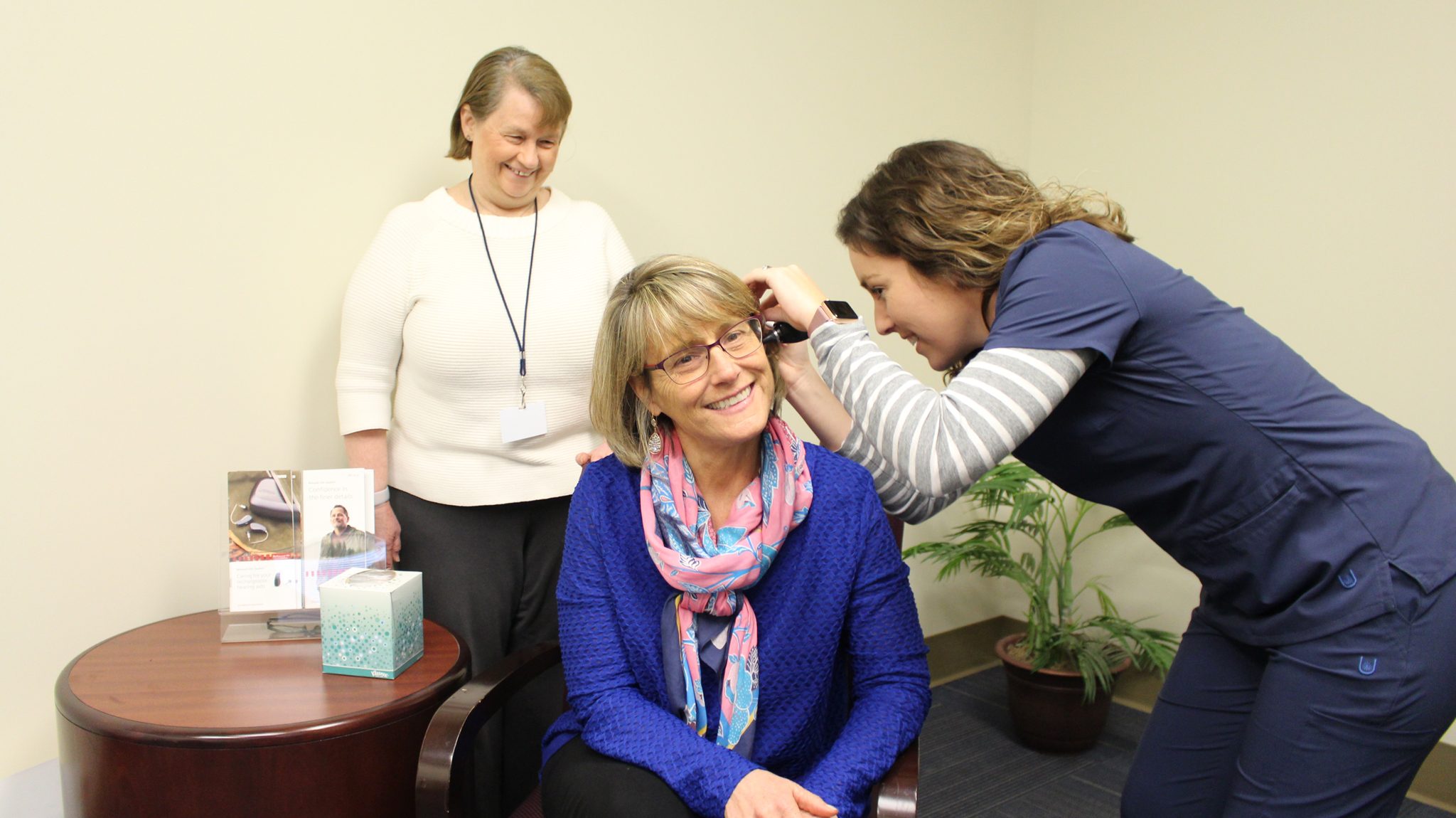
Mary Katherine Hendry (right), UM Speech and Hearing Clinic audiology extern, practices audiology clinical skills with Department of Communication Sciences and Disorders faculty member Rebecca Lowe as Anne Williams watches. Photo by Sarah Sapp/School of Applied Sciences
OXFORD, Miss. – The World Health Organization has designated March 3 each year as World Hearing Health Day to raise awareness to the growing numbers of people suffering from hearing loss and the importance of hearing health care.
In 2017, the National Institute of Health’s National Institute on Deafness and Other Communication Disorders reported that 48 million Americans suffer some type of hearing loss. The numbers grow annually.
The University of Mississippi Department of Communication Sciences and Disorders, or CSD, and the American Academy of Audiology are focused on educating the public on hearing loss, diagnosis, prevention and treatment.
“Noise-induced hearing loss is a preventable and significant factor,” said Vishakha Rawool, chair and professor of CSD and a member of the American Academy of Audiology.
“This growing health problem is often unrecognized in U.S. adults, adolescents and children, and it leads to a long list of problems including depression, isolation, academic delays, impaired communication and cognitive decline. We are grateful that this awareness day was created to shine a light on the significance of hearing loss.”
Rawool is the author of the widely used textbook “Hearing Conservation: In Occupational, Recreational, Educational, and Home Settings” (Thieme, 2011) and several related articles, including “Growing Up Noisy: The Sound-exposure Diary of a Hypothetical Young Adult,” published in the Hearing Review, and “Audiological Implications of the Opiate Epidemic,” published in the Hearing Journal.
As the baby boomer population ages, more Americans are forced to face hearing health challenges. About 20 percent of American adults aged 20 to 69 have some trouble with hearing and an estimated 28.8 million could benefit from the use of hearing aids, according to the National Institute on Deafness and Other Communication Disorders.
While age is still the greatest factor in hearing loss, many younger people also experience hearing problems due to exposure to loud music and sounds including occupational noise. Among adults aged 70 and older with hearing loss who could benefit from hearing aids, fewer than one in three (30 percent) has ever used them.
Among adults aged 20 to 69, only some 16 percent of those who would benefit from hearing aids have ever used them.
“Audiologists are the experts in hearing health,” Rawool said. “Anyone suspecting a hearing issue should see an audiologist, who will run a series of tests to determine the problem, if there is one, and will then recommend treatment.”
Some signs of hearing loss may include:
- Suddenly having to turn up the volume of the television, radio or stereo and having other family members complain that the volume is too loud
- Difficulty understanding people speaking to you and asking people to repeat themselves
- Difficulty with phone conversations and understanding the other person
- Sudden inability to hear the doorbell, a dog barking and other household sounds
- People telling you that you speak too loudly
- Ringing in the ears
School-aged children with hearing loss sometimes exhibit poor school performance because they can’t understand the teacher, assignments or classroom interactions. If hearing loss has been present from a young age, they often don’t recognize the loss and can’t identify the problem.
The UM Speech and Hearing Clinic, housed within the Department of Communication Sciences and Disorders, is at 2301 South Lamar Blvd., North Entrance, Suite 1200. It provides the highest quality of speech-language-hearing services to patients in an effective and efficient manner.
Contact the clinic at 662-915-7271 or umcdshc@olemiss.edu for appointments.